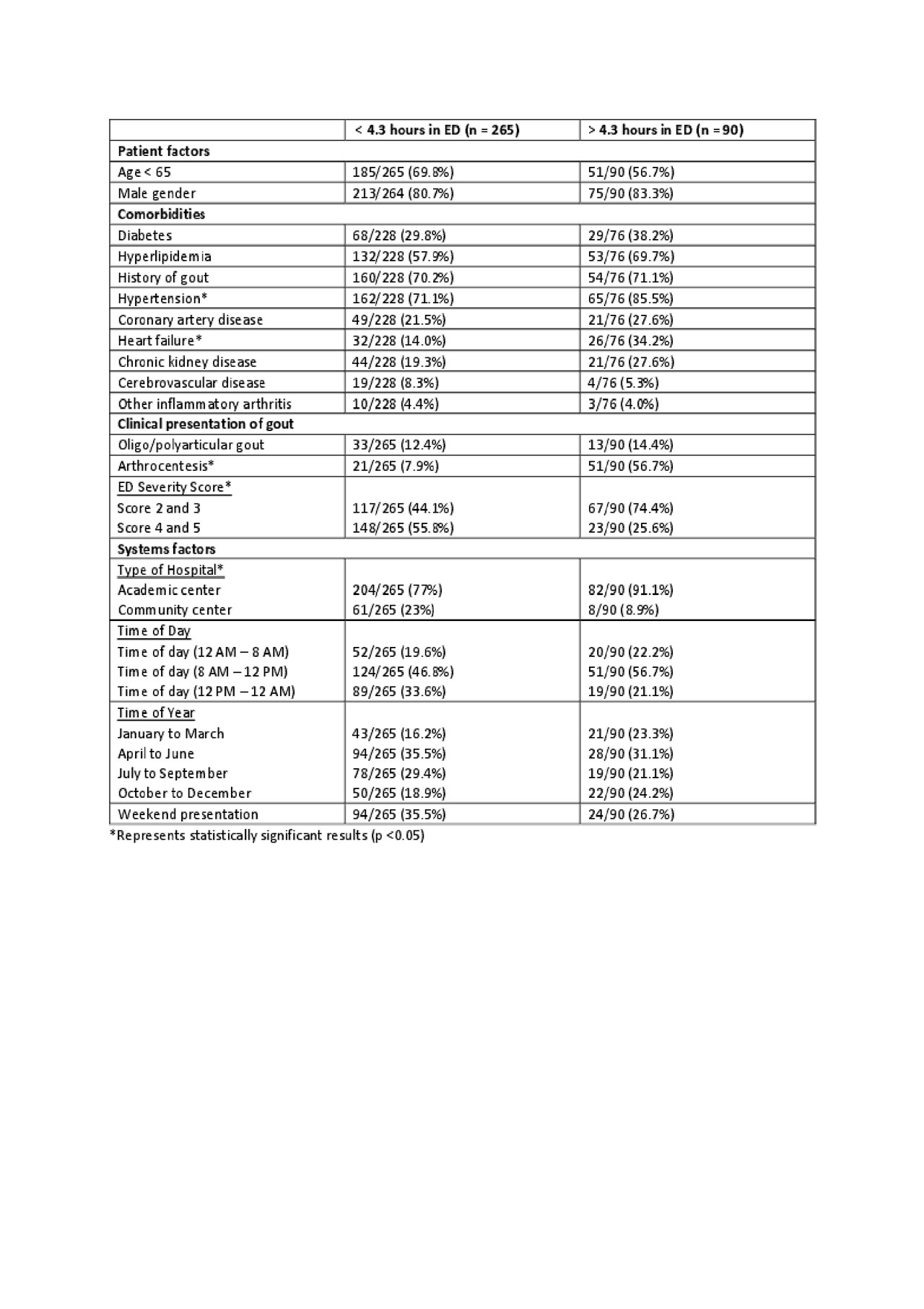Session Information
Session Type: Poster Session (Sunday)
Session Time: 9:00AM-11:00AM
Background/Purpose: Emergency department (ED) visits for acute gout increased by approximately 20% between 2006 and 2014 in the United States. (1) Reducing ED length of stay (LOS) can help reduce ED crowding and cost of care for gout patients. The aim of our study was to assess ED LOS and to identify factors associated with prolonged ED LOS in patients with acute gout.
Methods: In this retrospective analysis, we included the first ED visit of adult patients ( >18 years) with acute gout who presented to the 3 EDs affiliated with Lifespan Health Systems, the largest healthcare provider in Rhode Island. The study period was between 3/30/2015 and 9/30/2017. We calculated ED LOS as the time spent by patients in the ED until they were discharged. Patients presenting to the ED and subsequently admitted to the hospital were excluded given the differential effect of systems factors in these patients. We assessed the following factors’ association with being in the upper quartile of ED LOS: (a) patient factors – demographics, comorbidities and clinical presentation of gout (number of joints involved, severity as gauged by an ED triage nurse on a scale of 1 to 5; 1 being the worst) and (b) systems factors – time of day, day of the week, and time of year at presentation to the ED, and teaching versus non-teaching hospital setting. We performed univariate and multivariable analyses.
Results: A total of 355 patients (mean age 56.6 ± 16.03 years, 81.3% males) were included. The median ED LOS was 2.65 hours (1.75, 4.3 hours). In the univariate analysis, older age ( > 65 years), comorbidities (hypertension, congestive heart failure) and worse ED severity score among patient factors and being treated at a teaching hospital ED among systems factors were associated with being in the upper quartile of ED LOS. Performing arthrocentesis was also associated with being in the upper quartile of ED LOS (Table 1). In a multivariable analysis, age > 65 years, performing arthrocentesis, and worse acuity score continued to be associated with longer ED LOS.
Conclusion: In our study settings, patients with acute gout spent a longer time in the ED than the national median of 120-150 minutes. (2) We noted that older age and higher acuity score in addition to procedural delays led to longer length of stay in the ED.
References:
(1) Mithal, A., & Singh, G. (2018). OP0185 Emergency department visits for gout: a dramatic increase in the past decade
(2) Centers for Disease Control and Prevention. (2014). QuickStats: median emergency department (ED) wait and treatment times, by triage level–National Hospital Ambulatory Medical Care Survey, United States, 2010-2011. Morb Mortal Wkly Rep, 63, 439. (https://www.cdc.gov/mmwr/preview/mmwrhtml/mm6319a8.htm)
To cite this abstract in AMA style:
Mbuyi N, Reinert S, Hilliard R, Reginato A, Dalal D. Emergency Department Length of Stay in Patients with Acute Gout [abstract]. Arthritis Rheumatol. 2019; 71 (suppl 10). https://acrabstracts.org/abstract/emergency-department-length-of-stay-in-patients-with-acute-gout/. Accessed .« Back to 2019 ACR/ARP Annual Meeting
ACR Meeting Abstracts - https://acrabstracts.org/abstract/emergency-department-length-of-stay-in-patients-with-acute-gout/

